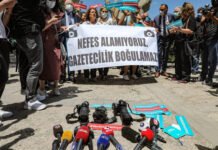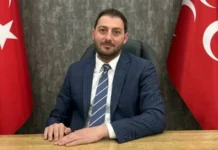A Turkish court on Monday released academic Cenk Yiğiter, who was detained by police on Friday along with a group of university students and interrogated for three days, according to a report by online news portal Bianet.
Yiğiter, a former law professor at Ankara University, was one of more than 2,000 academics across Turkey who signed a petition titled “We will not be a party to this crime” in January 2016, calling for a peaceful solution to the military conflict between Turkish security forces and the outlawed Kurdistan Workers’ Party (PKK).
In the petition the signatories said they condemned the violence against the Kurds and the Turkish government’s ongoing violation of its own laws and international treaties. More than 400 signatories, known as “Academics for Peace,” have been removed from their positions at universities over the past two years, including Yiğiter.
Yiğiter’s lawyer, Erkan Çiftçi, told Bianet that his client had been charged with “engaging in actions and activities in the name of a terrorist organization” due to his social media posts and statements he made to the press following his dismissal from Ankara University in January 2017.
“I am a doctor of law fired by a government decree. I am not allowed to write in academic journals, to attend academic meetings. I can’t work in public universities. I can’t work in private universities. I am not allowed to work as a lawyer. I am not allowed to be a student at Ankara University. I am not allowed to have a passport and go abroad,” Yiğiter tweeted on Nov. 2.
Yiğiter was reportedly asked whether he knew the students who were detained along with him and remain in custody on similar charges. Yiğiter said he had had a conversation with one of them but did not know the others.
During his interrogation, Yiğiter also said he had no sympathies for the PKK and denied the charges.
The peace academics have been faced pressure and legal action upon an instruction by Turkish President Recep Tayyip Erdoğan, who called them “traitors” and “so-called intellectuals.” Dozens of those who undersigned the declaration were dismissed from their jobs or detained by counterterrorism police while their offices were also raided by the police for “evidence of links to terrorism.”
Yiğiter was sentenced on Oct. 5, 2018, by a Turkish court to one year, five months in prison for allegedly insulting President Erdoğan in a social media post that did not mention him by name.
Although Turkish courts usually suspend sentences for the scores of people convicted of insulting Erdoğan in a first-time offense, the judges, in this case, imposed a custodial sentence.
“When someone said ‘Reis’ in the past, I used to think of Chief Temel,” Yiğiter said on Twitter, referring to the cartoon character Popeye, who is known as Chief Temel in Turkey. “Reis,” meaning chief, is a term that has come to refer to Erdoğan, who has run Turkey for the last 15 years. “Now, I think of an idiot,” Yiğiter said.
Yiğiter, who was dismissed from the Ankara University law faculty under a state of emergency decree-law, has also not been allowed to study at the communications faculty of the same university despite passing the entrance examination.
Ankara University added an article to a regulation issued on Aug. 8, 2017 and said students who earned the right to register at the university shall not have been dismissed from public service.
According to a BBC Turkish report, a total of 23,427 academics have been affected by a state of emergency that was declared following a failed coup attempt on July 15, 2016.
The report said at least 23,427 academics either lost their jobs at universities when their contracts were terminated or were dismissed from their positions, or the universities where they worked were closed down by the government after Sept. 1, 2016.
According to a report by Turkey’s state-run Anadolu news agency on July 21, police teams under the command of the cybercrime unit have determined the existence of 126,000 social media accounts related to alleged terrorist organizations in the last two years.
The report said about 50,000 out of 68,000 profiled social media accounts that allegedly posted pro-coup messages in the wake of a coup bid in July 2016 belong to alleged members of the Gülen movement.
According to the report, 17,000 of the social media accounts are allegedly linked to the PKK, while a thousand of them are said to be connected to the Islamic State in Iraq and the Levant (ISIL).
It was also claimed that 60 percent of social media posts believed to be supportive of “terrorist organizations” have been made by alleged members of the Gülen movement. The Turkish government led by President Erdoğan has labeled the pacifist Gülen movement as a “terrorist organization,” calling it “FETÖ.”
















[…] http://stockholmcf.org/turkish-court-releases-academic-cenk-yigiter-after-three-days-in-detention/?… […]